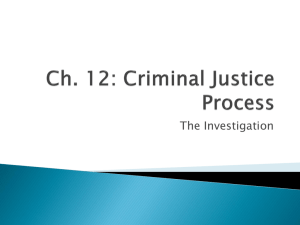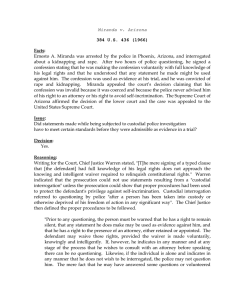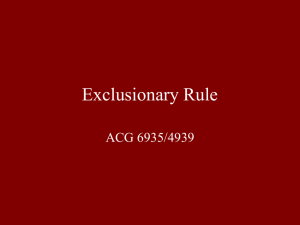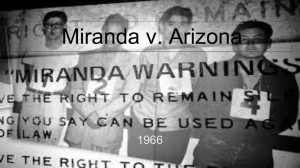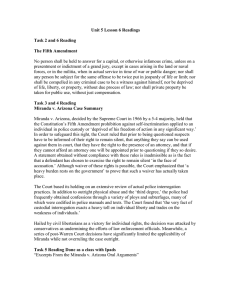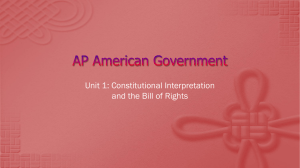Lecture - Right Against Self
advertisement
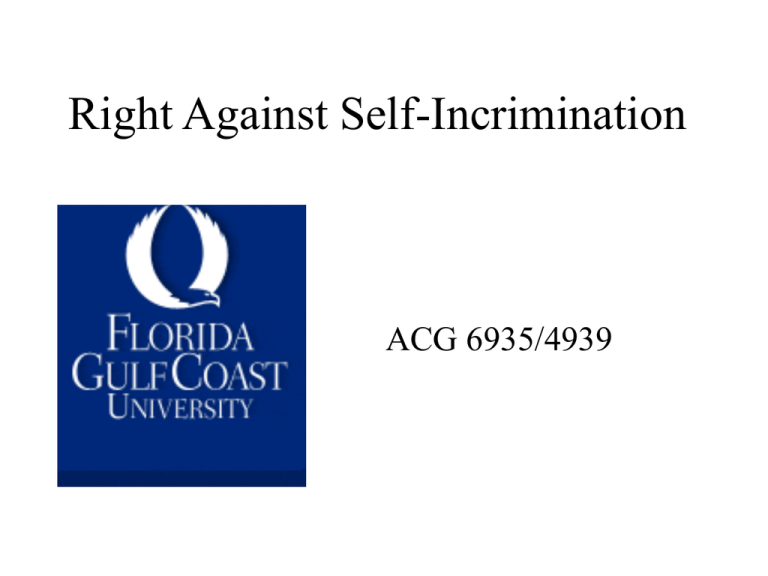
Right Against Self-Incrimination ACG 6935/4939 Based in the 5th Amendment • Can only be applied if defendant’s statement is testimonial. (not blood samples, fingerprints, etc.) • If the defendant’s response might be incriminating. • If the testimony could be used against the defendant in a criminal trial. Constitutional Basis • No person shall be compelled in any criminal case to be a witness against himself. • Reliability of the statement. • Avoidance of Coercion. • Conformance with Adversarial System. • Not applicable to non-U.S. Citizens. The Confession and SelfIncrimination • Confession has to be voluntary. • Did the suspect ask for an attorney? (6th Amendment Right to Counsel) • Landmark case Miranda v. Arizona Miranda Rights • Right to remain silent. • Anything said can and will be used against defendant. • Right to an attorney. • If suspect can’t afford one, an attorney will be appointed. Miranda • Courts ruled that the very nature of police interrogation is coercive. • Not mandated by the Constitution. • Defendant does not have to be told of the crime being investigated. When Does Miranda Apply? Custody & Interrogation • Suspect must feel he/she is not free to leave. • Police Station interview vs. McDonalds • Agents must begin to ask questions. • Miranda always assumed at arrest. Scenario #1 • Police arrest a suspect and start to give him Miranda warnings. • Before they can finish the warnings, the suspect doesn’t acknowledge the warnings but starts talking and gives a full confession. • The defense moves to suppress these statements. Are they successful? Scenario # • Police receive information that a supermarket is being robbed during business hours. • Police respond to the scene and see a suspect with an empty shoulder holster. • Police order the suspect to stop and he complies. • After doing a stop & frisk, police ask the suspect for the whereabouts of the weapon without advising of Miranda. • The suspect tells the police where the weapon is. • Will this statement be suppressed? Public Safety Exception • Public Safety is paramount to the adherence of Miranda. • Questions must be reasonably prompted by public safety issues. • Limited in scope. Scenario #2 • I.M.A. Fraud gets subpoenaed in a civil case where Fraud is being sued by clients of his investment firm alleging they have been defrauded. • Fraud is not aware of any criminal investigation into his business activities. • Fraud asserts his 5th Amendment rights at the deposition. • Can he be compelled to testify? Threat of Prosecution • If the threat exists, suspect does not have to answer questions. • If criminal process has been completed, he has no right to be asserted. • Can be asserted at any criminal proceeding. Scenario #3 • Slick Rapp receives a grand jury subpoena compelling him to produce the following items: • Handwriting • Fingerprints • Blood • Lie Detector Test • Are these a violation of Rapp’s right against self-incrimination? FBI Polygraph Test Scope • Bars only compulsory “self-incriminating” testimony. • Can apply when testimony would place a “link in the chain of evidence needed to prosecute.” • Whereabouts of a fugitive. Scenario #5 • Book Keeper is the custodian of records for ABC Corp. • Keeper receives a federal grand jury subpoena for ABC records. • The grand jury also wants Keeper to sign a consent needed to obtain foreign bank records • Keeper tries to assert his 5th Amendment rights. Is he successful? Records & Foreign Issues • Records are generally non-testimonial • No 5th Amendment right in Foreign prosecutions. • Compulsory signing of a consent form to retrieve bank records is not testimonial. Scenario # • King Fisher’s accountant receives a subpoena for records. Fisher is under indictment. • Fisher gave the documents in question to his attorney prior to the subpoena being issued. • The accounting records are incriminating. • Fisher files a motion that the turning over of these records would violate his right against self-incrimination. • Is he correct? At Trial • Can prosecutors tell the jury that the defendant refused to cooperate with police? • Must a judge tell a jury to draw no inference from whether a suspect testifies or not? At Trial (Cont.) • Who decides whether a defendant will testify? • What if the defendant refuses to answer questions on the stand? • Can the defendant be impeached with an illegally obtained confession? Voluntariness of a Confession • Defendant’s personal characteristics. • Nature of the detention. • Manner of Interrogation. • Use of force, threats, promises, or deception. Timeliness • McNabb-Mallory Rule. • Requires Agents to bring defendant before the judge as timely as possible. • Any statement made after an unreasonable delay is inadmissible. 6th Amendment Right to Counsel • Different from 5th Amendment Right. • Doesn’t attach until formal charges are filed. • As soon as 6th amendment right invoked, agents back off. Scenario # • Scum Bag is arrested for cocaine trafficking and thrown in jail. • Bag asserts his right to counsel. • A cellmate listens to Bag admit his involvement in transporting cocaine and stolen guns. • Bag tells police. • Police approach Bag the next day and question Bag about the stolen guns only. • Bag confesses to the stolen guns. • Bag wants these statements suppressed because he asserted his right to counsel. Offense Specific • Assert 6th amendment right for each case. • Blockburger test requires proof of an additional element that the other crime doesn’t require. • As long as Bag initiated conversation with cellmate or if cellmate acted alone, testimony is admissible. Scenario # • Shy Criminal is arrested and read his Miranda Rights. • Shy indicates he wants to remain silent. • Police immediately stop questioning Criminal. • Two hours later, Police approach Criminal, re-read his Miranda Rights and Criminal confesses to the crime. • Will this confession be suppressed? Cooling Off Period • Courts generally recognize as two hours. • Suspect can be reapproached and reread Miranda. • After invocation of counsel right, suspect must initiate new police contact. Scenario # • Lex Luthor is arrested and being interrogated by officers. • Luthor makes the statement “Maybe I should get a lawyer.” • Luthor then confesses to the crime in question. Will this confession be suppressed? Ambiguity • Has to imply or invoke the privileges. • Simply saying he/she is thinking about the certain privilege is not enough. • Don’t give advice to them. • Document & Document. Review • 5th Amendment • Is it testimonial in nature? • Miranda applies when there is both custody and interrogation. • Confession must be deemed voluntary. • Also has a right to counsel. • 6th Amendment • Must have formal charges. • Offense specific • Once this right is invoked, any new contact must be initiated by defendant. • Document Be on the Lookout for Terrorists
